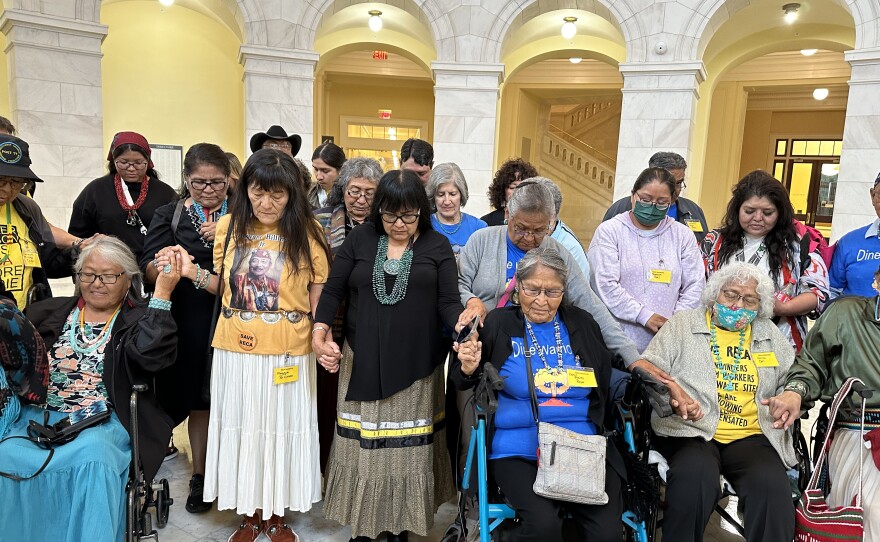Since the atomic bomb program began during World War II, countless Americans have been exposed to radiation, either from mining uranium or from the tests themselves. But compensation for the cancers and other medical problems caused by this exposure has been limited.
This summer, Congress allowed the main way of paying for treatment — the Radiation Exposure Compensation Act (RECA) — to expire. That’s been especially harmful to Native Americans and Mexican Americans living in the Southwest.
Oct. 15 marks the 34th anniversary of when RECA was ratified in 1990. The Union of Concerned Scientists, recently pointed out in a blog post that this year will be the first year that people sickened by nuclear testing programs won't be able to apply for compensation for medical bills and other costs associated with their illnesses.

In late September, members of several Tribes and others affected by radiation exposure traveled by bus to Washington to persuade lawmakers to revive and expand the compensation program. “Downwinders” are people who have been infected from toxicity following the atomic bomb tests of WWII. Tina Cordova is with the Tularosa Basin Downwinders Consortium in New Mexico. Her father lived just 45 miles from the Trinity bombing site.
“When the ash fell from the sky, it blanketed everything,” Cordova said. “It got into our water and our food. We inhaled it. We absorbed it through our skin.
“And in my own particular family, I'm the fourth generation to have cancer since 1945. And now we have a fifth generation.”
Walking through the U.S. Capitol’s halls in late September, Cordova was hoping to tell her family’s story. As was Phil Harrison, a member of the Navajo Nation and an underground uranium miner.
To make the atomic bomb, millions of tons of uranium ore were extracted — the majority of which came from the Navajo Nation. Thousands of Navajo people worked in those mines for decades, starting in the late 1940s.
“There was never a time when somebody said, ‘This is dangerous work for you, young man,’” Harrison said.
Today, hundreds of abandoned uranium mines remain within the Navajo nation and still pose a threat to the environment. Deadly chemicals continue to seep into the land and water and permeate the air.
RECA wasn’t established until the 1990s as a way to compensate families for the effects of nuclear testing. But even then, some saw fault with the program.
First, its geographic parameters were seemingly arbitrary. Even though a “downwinder” area was outlined, mMany areas close to the testing sites in New Mexico were left out. And with modern technology, scientists determined the radioactive plumes reached across the country, even into eastern states. Exposures have been documented as far away as Guam.

RECA also didn't cover uranium workers after 1971, even though many mines were operational after that year.
Lawmakers such as New Mexico Representative Melanie Stansbury said the government needs to take responsibility.
“People who are living with the pain, living with the cancers, living with the diseases that were caused by the U.S. government's efforts to win these wars and to carry out these efforts should not have to get on a bus and travel across the country to get justice,” Stansbury said.
Last summer, the Senate passed an expanded version of the original Radiation Exposure Compensation Act, but the House has yet to vote on it.
Conservative Republicans have balked at the estimated multi-billion dollar cost for expanding the compensation program. Spending caps have been proposed.
One cost-saving proposal is to separate the “downwinders” from the miners – a concession advocates are not willing to make, said Dawn Chapman with “Just Moms” of Missouri. That organization works to raise awareness of the effects of radiation exposure in Missouri and surrounding areas.
“How dare anybody, anybody expect me to let somebody else's kid die that is dangling hope in front of us,” Chapman said. “We will not have it. This room is united.”
Ceremonial dances and prayers preceded the Tribes’ arrival at House Speaker Mike Johnson's office.

Johnson has never agreed to meet with the group, so they set out to deliver symbolic medical bills to his office. Virginia Chavez brought one for her husband, Randolph, who died seven years ago.
“$1,277,640 for his treatment for his cancer,” Chavez said.
While Johnson’s aide politely accepted their documents, he told them this was not the appropriate way to get the speaker’s attention. Tina Cordova, representing downwinders, said they’ve tried other options with no success.
“How could another human being not recognize the humanity of this sacrifice and this suffering?” she asked.
Harrison, the uranium worker, said it’s discrimination.
“I don’t know how to educate members of Congress, they’re not really interested,” he said. “To me a lot has to do with racism.”
Outside the speaker’s office, advocates such as Kathleen Tsosi prayed for a new path forward.
“I prayed for speaker Mike Johnson to change his mind and to have the heart and the compassion as well as the House of Representatives to change their mind and approve the RECA bill,” said Tsosi, after praying for Congress and the speaker in her native Navajo language.

Later, with the Capitol in the background and luminarias in front, those gathered remembered their loved ones and read their names out loud.
Mary Martinez-White, whose entire family has contracted cancer, said this is a “silent killer” that should be of concern to all Americans.
“It continues because only three pounds of the weapons grade plutonium fissioned and 10.7 pounds is still out there blowing in the wind,” Martinez-White said. “And it has a half life of 24,000 years.”
Activists are hoping there may be a new perspective after the November election.
This story was produced by the Mountain West News Bureau, a collaboration between Wyoming Public Media, Nevada Public Radio (KNPR) in Las Vegas, Boise State Public Radio in Idaho, KUNR in Nevada, KUNC in Colorado and KANW in New Mexico, with support from affiliate stations across the region. Funding for the Mountain West News Bureau is provided in part by the Corporation for Public Broadcasting.











